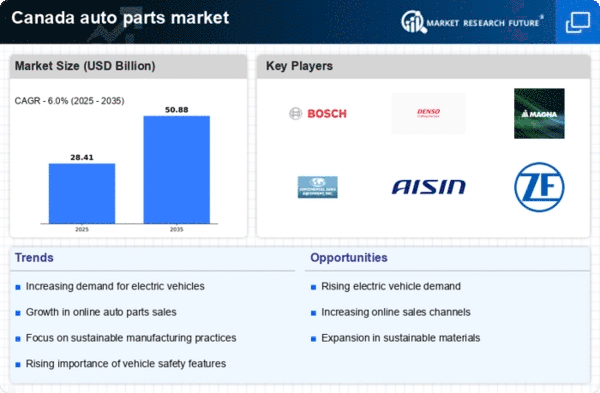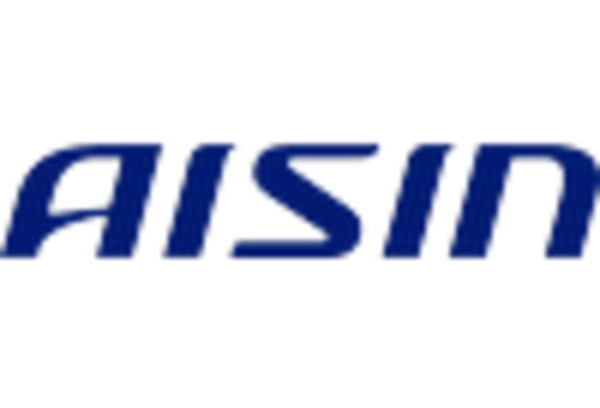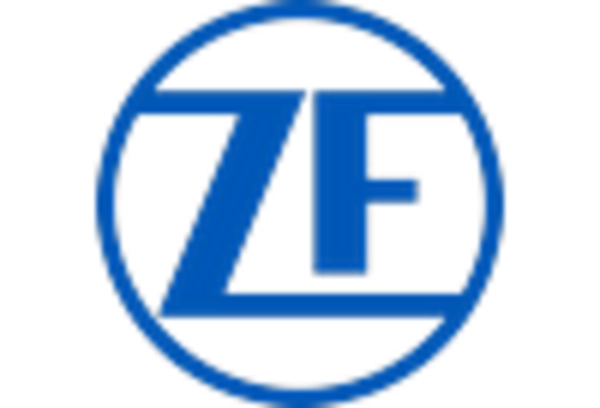Increasing Vehicle Ownership
The rising vehicle ownership in Canada is a significant driver for the auto parts market. As of 2025, the number of registered vehicles in Canada has surpassed 30 million, indicating a robust demand for replacement parts and accessories. This trend is further fueled by the increasing average age of vehicles on the road, which now exceeds 9 years. Consequently, the auto parts market is poised for growth as consumers seek to maintain and repair their vehicles. This demand for aftermarket parts is expected to contribute to a projected market growth rate of approximately 5% annually over the next five years.
Growth of Online Retail Channels
The auto parts market in Canada is witnessing a substantial shift towards online retail channels. E-commerce platforms are becoming increasingly popular among consumers seeking convenience and competitive pricing. As of 2025, online sales of auto parts are projected to grow by 15% annually, reflecting changing consumer preferences. This trend compels traditional retailers to adapt their business models, integrating online sales strategies to remain competitive. The auto parts market must embrace digital transformation, enhancing customer engagement through improved online services and logistics. This evolution could lead to a more dynamic and accessible marketplace for consumers.
Regulatory Compliance and Safety Standards
The auto parts market in Canada is heavily influenced by stringent regulatory compliance and safety standards. The government mandates that all automotive components meet specific safety criteria, which drives manufacturers to invest in high-quality materials and technologies. This focus on safety not only enhances consumer trust but also increases the demand for certified parts. As regulations evolve, particularly concerning emissions and safety, the auto parts market must adapt, potentially leading to increased costs for manufacturers. However, this could also create opportunities for innovation and the development of advanced safety features in new products.
Shift Towards Electric and Hybrid Vehicles
The transition towards electric and hybrid vehicles is reshaping the auto parts market in Canada. With the government promoting green initiatives and aiming for a significant reduction in carbon emissions, the demand for electric vehicle components is on the rise. By 2025, it is anticipated that electric vehicles will account for over 20% of new car sales in Canada. This shift necessitates a re-evaluation of the auto parts market, as traditional components may become obsolete while new parts, such as battery systems and electric drivetrains, gain prominence. This evolution presents both challenges and opportunities for manufacturers.
Technological Advancements in Manufacturing
The auto parts market in Canada is experiencing a notable transformation due to technological advancements in manufacturing processes. Innovations such as 3D printing and automation are enhancing production efficiency and reducing costs. For instance, the integration of robotics in assembly lines has led to a 20% increase in productivity, allowing manufacturers to meet the growing demand for high-quality components. Furthermore, these technologies enable the production of customized parts, catering to specific consumer needs. As a result, the auto parts market is likely to witness a shift towards more agile manufacturing practices, which could enhance competitiveness and profitability.
















